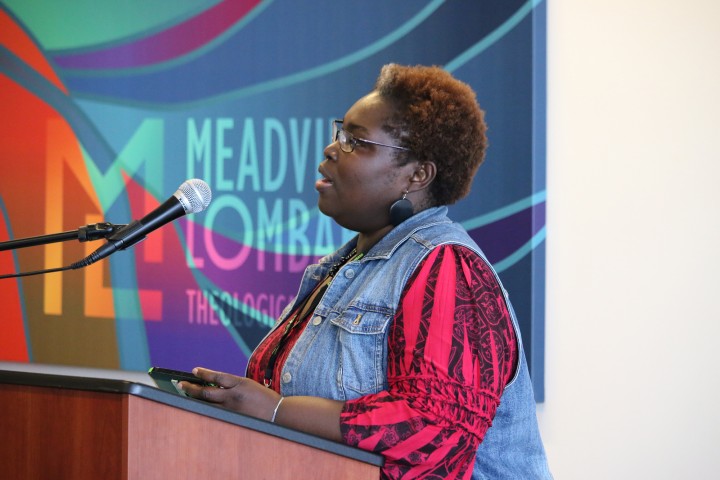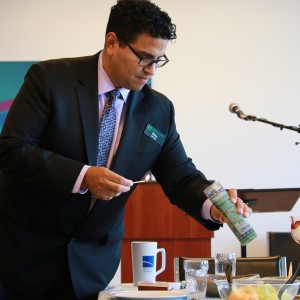Uncovering the Hope
 Rev. Margalie Belizaire, MDiv '20, delivered this homily on May 31, 2020, during the Church of the Larger Fellowship Sunday service.
Rev. Margalie Belizaire, MDiv '20, delivered this homily on May 31, 2020, during the Church of the Larger Fellowship Sunday service.
I’ve been reflecting quite a lot on the idea of apocalypse as of late. Not the conjuring of it that members of the faith of my youth, Jehovah’s Witness, have been looking forward to. That is to say, a time of destruction. A time of catastrophe. Or a day of reckoning. No. No. Not that idea of an apocalypse. I have instead been pondering on another interpretation of the word. On how apocalypse also means revelation or the revealing of that which was hidden. It’s a rendering of the term that we tend to forget for some reason. And that’s exactly the one I wish to explore with you today.
I believe that if we are honest with ourselves, we need to admit that we are living in an apocalyptic time. A time of astonishing revelations:
Where a nation elects to its highest office “the scariest racial demagogue in a generation,” just after having “elect(ed) its first black president.” (Michael Eric Dyson)
Where brown and black children are being ripped from their parents’ arms and placed in cages.
Where the prison industrial complex has become another way to enslave black men and profit from their labor when those same black men are not not being killed on the streets by police officers with no repercussions.
And so on…
And if we’re going to be truly sincere, we might need to admit that, at least here in the United States, these revelations—this apocalypse—ramped up following the presidency of Barack Hussein Obama. I was surprised that he was not only elected once but gained the votes to serve a second term. Also many, including myself, interpreted at least his first election as hope manifested.
However, we quickly noticed how his presidency instead brought to light so much of the hidden animosities towards people of color—things that black folks have been experiencing all along, but were not perceived (and I use the term loosely) by the dominant white culture. I say loosely because this lack of perception is perhaps tied to an underestimation by white liberals of how deep and wide racism permeates the fabric of this nation, as an author and activist Sharon Welch suggests.
I read an article by the Haitian-American author Edwidge Danticat, titled, “Message to my Daughters.” In it, Danticat makes the case for refugee status for African Americans living in the United States. To support her views, she cites part of an essay that an immigration attorney Raha Jorjani wrote for The Washington Post:
“Suppose a client walked into my office and told me that police officers in his country had choked a man to death over a petty crime. Suppose he said police fatally shot another man in the back as he ran away. That they arrested a woman during a traffic stop and placed her in jail, where she died three days later. That a 12-year old boy in this country was shot and killed by the police as he played in the park. Suppose he told me that all of those victims were from the same ethnic community—a community whose members fear being harmed, tortured, or killed by police or prison guards. And that this is true in cities and towns across his nation. At that point, as an immigration lawyer, I’d tell him he had a strong claim for asylum protection under U.S. law.”
This is our country right now. This is our America. We have Americans needing asylum from their own government. It is that serious, my friends. Danticat’s article was one I was to read and then later discussed with a group of colleagues. It dawned on me as we were talking that, though it was an emotional experience for me because I have already lived through most of the events Danticat talked about, for my colleagues it was new information to be used as fodder for philosophical discourse. In other words, this was no intellectual exercise for me. This was part of my lived experience as a person of color. This was the reality my body felt. And the reality that many black bodies of America feel every day.
I worry because we, the people, have been fighting those injustices for so long, yet they remain strong and ready to do even more damage. Worse, these injustices and their impacts now appear to be endorsed openly by those in power, from the very top on down. To have, in 2019, white supremacist groups marching down the main street spewing anti-black and ant-sematic garbage. To then have the sitting president of the United States publically sympathize with them is crushing.
At the same time, the work of racial justice must continue, for what is the alternative. There is no alternative. For the marginalized. For people who see the value in “the goal of world community with peace, liberty, and justice for all” (our Unitarian Universalist Sixth Principle), the work must continue.
As people of faith, the apocalypse is upon us. Yes. But, it ought not to scare us into inaction. As Unitarian Universalists, this is where we ought to take our place as leaders in the world and press on with the work toward a world where there is “justice, equity and compassion in human relations” as our Second Principle aspires.
Yet, it is important to name how inaction, maybe because of weariness. Maybe because of heartbreaks. Or from being burned out. Or inaction because one chooses (because it is a choice, my friends) to disbelieve the oppressed, or outrightly dismiss racism, as Welch noted. How inaction can and does enable evil to endure and thrive. Yes. It is difficult to persist in justice work when our spirits are weighed down. At the same time, we can’t take our eyes off evil.
Still, the Rev. Dr. William Sinkford cautions against our tendency to overwhelmingly focus on “calling out the flaws” of progressive people like ourselves. That even as we work mindfully to create a just world, we focus on calling out the things we are doing wrong. While that is helpful at times, he continued, "that alone is not sufficient. We, each of us, must have a word of hope to offer and a dream or vision that calls us forward.” That is all of us.
We UUs don’t evangelize. But we naturally preach to others about our religion by the way we live our lives. So, I ask you, what is the message that we’re giving the world? What are we saying to the marginalized? Especially in this time of apocalypse, how are we projecting a hopeful disposition? I don’t mean empty hope. I’m talking about the kind of hope that Rebecca Solnit speaks of in Hope in the Dark. “Hope is not a lottery ticket you can sit on the sofa and clutch, feeling lucky. It is an axe you break down doors with in an emergency. Hope should shove you out the door, because it will take everything you have to steer the future away from endless war, from the annihilation of the earth's treasures, and the grinding down of the poor and marginal… To hope is to give yourself to the future—and that commitment to the future is what makes the present inhabitable.”
Hope requires action on our part, and commitment. “We are the ones we’ve been waiting for” as many have said before me.
We might have had the luxury to live in denial in the past. We made the mistake of thinking that we were much further along than we thought. As a country and as a faith tradition. We had the audacity to think we had moved beyond racism because we had elected a black president. The revelations of the past few years, the events of the past few months, the brutal killing of George Floyd just a week ago, have told us otherwise. Accordingly, we must not look away from all that which has been revealed to us. Moreover, as people of faith, we can’t continue to live as if these revelations mean nothing. That it’s business as usual.
As Unitarian Universalists, we profess that social justice is our “sweet spot.” Well then, let’s claim this moment and shine.
Welch asks, “What enabled the first victory of Barack Obama, and what propelled the backlash?” As a denomination, we are a microcosm of the larger population. So, with the revelations of the past decade, let us too ask such questions and reassess our work thus far. And make course adjustments as needed.
Let’s be leaders in this moment of exceptional hopelessness and fatigue.
We are made for such times.
The work ahead of us will not be easy. The very fact that we are still where we are today with regards to race tells us that it’s difficult work ahead of us. There is much figuring out to be done. As Dyson states, we are a “nation in grave need of moral repair, a repair only possible if white people join people of all races and learn from them the current costs and painful history of racial injustice.” (Welch)
Things might seem dire. In fact, everything around us seems to be supporting that idea. But, I’m here to tell you that it hasn’t yet been decided. As long as we have breath, as long as we remain in the fight. All is not lost. Beloveds, we find ourselves in the midst of an apocalypse. We have so many possibilities ahead of us, so many choices to make as to how we will use these revelations. Let’s choose to find a better way. Let’s uncover the hope.
Watch the sermon:

Rev. Margalie Belizaire
Rev, Margalie Belizaire graduated with MDiv in May 2020. As an MLTS student, she interned at Unitarian Church in Westport, CT, and served as a Learning Fellow for the Church of the Larger Fellowship, Unitarian Universalist online congregation. She will start serving in summer 2020 as the Minister for Pastoral Care and Adult Spiritual Development at First Unitarian Church of Rochester, NY.

